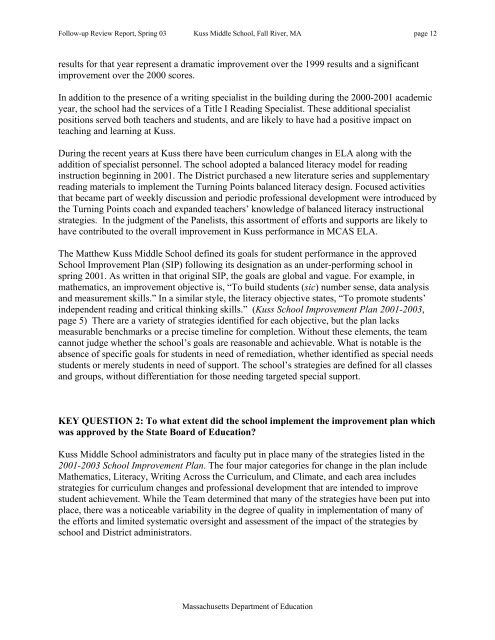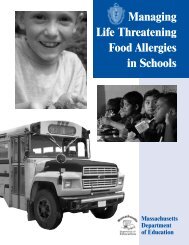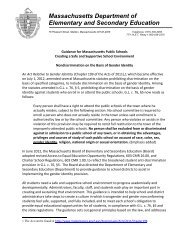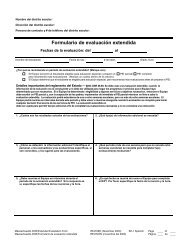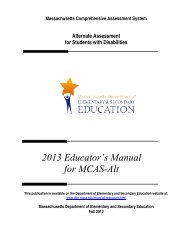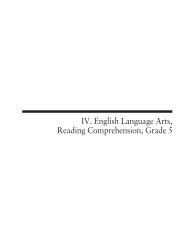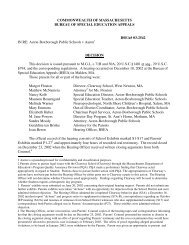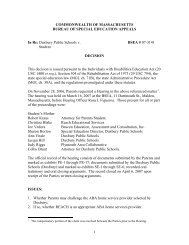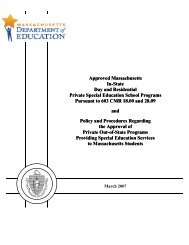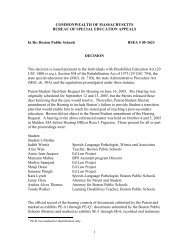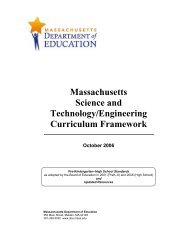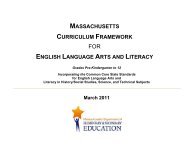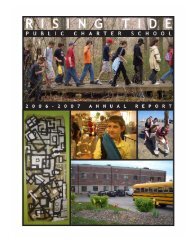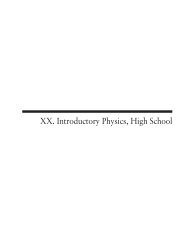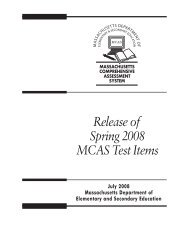Two Year Follow-up Review for Matthew J. Kuss Middle School
Two Year Follow-up Review for Matthew J. Kuss Middle School
Two Year Follow-up Review for Matthew J. Kuss Middle School
Create successful ePaper yourself
Turn your PDF publications into a flip-book with our unique Google optimized e-Paper software.
<strong>Follow</strong>-<strong>up</strong> <strong>Review</strong> Report, Spring 03 <strong>Kuss</strong> <strong>Middle</strong> <strong>School</strong>, Fall River, MA page 12<br />
results <strong>for</strong> that year represent a dramatic improvement over the 1999 results and a significant<br />
improvement over the 2000 scores.<br />
In addition to the presence of a writing specialist in the building during the 2000-2001 academic<br />
year, the school had the services of a Title I Reading Specialist. These additional specialist<br />
positions served both teachers and students, and are likely to have had a positive impact on<br />
teaching and learning at <strong>Kuss</strong>.<br />
During the recent years at <strong>Kuss</strong> there have been curriculum changes in ELA along with the<br />
addition of specialist personnel. The school adopted a balanced literacy model <strong>for</strong> reading<br />
instruction beginning in 2001. The District purchased a new literature series and s<strong>up</strong>plementary<br />
reading materials to implement the Turning Points balanced literacy design. Focused activities<br />
that became part of weekly discussion and periodic professional development were introduced by<br />
the Turning Points coach and expanded teachers’ knowledge of balanced literacy instructional<br />
strategies. In the judgment of the Panelists, this assortment of ef<strong>for</strong>ts and s<strong>up</strong>ports are likely to<br />
have contributed to the overall improvement in <strong>Kuss</strong> per<strong>for</strong>mance in MCAS ELA.<br />
The <strong>Matthew</strong> <strong>Kuss</strong> <strong>Middle</strong> <strong>School</strong> defined its goals <strong>for</strong> student per<strong>for</strong>mance in the approved<br />
<strong>School</strong> Improvement Plan (SIP) following its designation as an under-per<strong>for</strong>ming school in<br />
spring 2001. As written in that original SIP, the goals are global and vague. For example, in<br />
mathematics, an improvement objective is, “To build students (sic) number sense, data analysis<br />
and measurement skills.” In a similar style, the literacy objective states, “To promote students’<br />
independent reading and critical thinking skills.” (<strong>Kuss</strong> <strong>School</strong> Improvement Plan 2001-2003,<br />
page 5) There are a variety of strategies identified <strong>for</strong> each objective, but the plan lacks<br />
measurable benchmarks or a precise timeline <strong>for</strong> completion. Without these elements, the team<br />
cannot judge whether the school’s goals are reasonable and achievable. What is notable is the<br />
absence of specific goals <strong>for</strong> students in need of remediation, whether identified as special needs<br />
students or merely students in need of s<strong>up</strong>port. The school’s strategies are defined <strong>for</strong> all classes<br />
and gro<strong>up</strong>s, without differentiation <strong>for</strong> those needing targeted special s<strong>up</strong>port.<br />
KEY QUESTION 2: To what extent did the school implement the improvement plan which<br />
was approved by the State Board of Education?<br />
<strong>Kuss</strong> <strong>Middle</strong> <strong>School</strong> administrators and faculty put in place many of the strategies listed in the<br />
2001-2003 <strong>School</strong> Improvement Plan. The four major categories <strong>for</strong> change in the plan include<br />
Mathematics, Literacy, Writing Across the Curriculum, and Climate, and each area includes<br />
strategies <strong>for</strong> curriculum changes and professional development that are intended to improve<br />
student achievement. While the Team determined that many of the strategies have been put into<br />
place, there was a noticeable variability in the degree of quality in implementation of many of<br />
the ef<strong>for</strong>ts and limited systematic oversight and assessment of the impact of the strategies by<br />
school and District administrators.<br />
Massachusetts Department of Education


